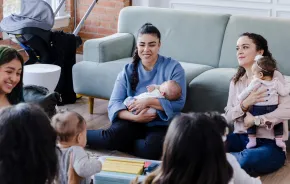 Sacha Davis’ son was dearly attached to his bottle. As a baby, he needed it for nutrition, but he kept on getting his milk from a bottle and eventually it just became part of his routine — a habit his mothers didn’t feel the need to change until he was ready. That didn’t happen until recently, when he was 4 years old.
Sacha Davis’ son was dearly attached to his bottle. As a baby, he needed it for nutrition, but he kept on getting his milk from a bottle and eventually it just became part of his routine — a habit his mothers didn’t feel the need to change until he was ready. That didn’t happen until recently, when he was 4 years old.
“We were fine with him stopping at 4,” says Davis, of Seattle. “We never felt a strong need to quit. No one instructed us to quit; they didn’t really talk about it.”
Today, people are indeed talking about it and in fact, a recent study found that prolonged bottle feeding could contribute to childhood obesity, along with other negative impacts.
So how long is too long to drink milk from a baby bottle? Is it time for your toddler to get on the wagon, so to speak? And if so, how do you prepare yourself for — or better yet, avoid — the tears (theirs and yours) that can result when a favorite comfort item needs to “go bye-bye”?
Too much of a good thing?
Researchers at Temple University followed more than 6,000 children from birth to 5 and a half years of age and found that children who drank milk from a bottle at 24 months of age were 30 percent more likely to be obese. The results rang true even after researchers accounted for other factors, such as the mother’s weight, the child’s birth weight and feeding practices during infancy. The study could not account for current feeding practices or quality of food.
“The baby bottle is something we consider when a young child gains weight too quickly,” says Dr. Lenna Liu, a pediatrician at the Odessa Brown Children’s Clinic at Seattle Children’s Hospital. “We’re also worried about tooth decay from prolonged exposure to milk.” Excess milk is also associated with anemia, because too much milk blocks the absorption of iron.
“For young toddlers, an 8-ounce bottle of whole milk can contain close to 12 percent of their daily caloric intake,” says Rachel Gooze, co-author of the study. After they hit their first birthday, 1- and 2-year-olds should have 16 to 24 ounces of milk per day, Liu says. Any additional milk, even low fat, adds unnecessary calories.
But if your child isn’t overweight now or having visible problems, do you really need to worry? After all, having a magic item to soothe a frustrated or sleepy child is something no harried parent in her right mind would give up, right?
“The study gives me pause, but I wouldn’t change anything,” Davis says. “I just want to make sure my son doesn’t develop eating problems. Making food a non-issue in my house is important.”
“Neither of my children had a soothing toy or blanket. [The bottle] was their soothing thing,” says Amanda Rench of Sammamish of her children, ages 4 and a half and 2 and a half. Her children would only drink milk from a baby bottle, and she didn’t want them to give up milk, so she allowed them to stay in their comfort zones. Her oldest gave up the bottle shortly after he turned 2, and her youngest is still using one.
But to prevent obesity and avoid problems with tooth decay and iron deficiency, early intervention is best, Liu advises. “It’s easier to modify their diet when they’re little than to modify it when they’re older and obese.” For example, if toddlers are gaining excessive weight, it’s easier to eliminate juice from their diet than when they’re older and the routine has taken hold.
 Kicking the habit
Kicking the habit
Helping babies make the transition from bottle to cup can be an emotional and exhausting experience — for all parties.
“My first used her bottle until she was almost 2, and my second one is still using it,” says Lisa Benson of Everett, of her daughters, ages 3 and a half and 1 and a half. “My first wouldn’t go to bed. She would scream for an hour to an hour and a half, so we started putting her to bed with a bottle of water. It was terribly stressful listening to her scream, and she had no interest in sippy cups. My second daughter goes to bed sometimes with a bottle of milk. Both of my daughters are in the 30th percentile for weight, and they’re long and lean. They have no cavities, and their speech is good.”
Liu recommends that parents teach children to drink from a cup between 9 months and 1 year of age. “Parents should slowly move [toddlers] from a bottle to a cup, and they should drink milk with meals, not for comfort,” says Liu. “Drinking water from a cup from 9 to 12 months helps them get used to drinking something that’s not sweet.”
Liu says big junctures are good times for parents to persuade children to graduate from one comfort item to another; birthdays are great for that purpose. Or once the bottle’s nipple breaks, they can tell their child that the bottle doesn’t work anymore. “If they throw huge tantrums and nothing’s working, you just tolerate the tantrums.” Breaking the habit benefits the child’s health, and the tantrums will only last a short period of time, she says.
Last call
If you put your child to bed with a bottle, says Liu, switch to water as Benson did with her first child. Liu recommends diluting the child’s milk with water over a period of time.
A baby bottle filled with water is better than milk, but, Liu advises, “[Children] need to learn to go to sleep on their own, without being rocked, or held, or using a bottle. It’s a skill.” Learning to self-soothe will help at bedtime and when the child awakens in the night.
Even infants don’t need to eat at night once they sleep for longer stretches, Liu says. Nursing them or giving them a bottle at night after 4 months of age provides more comfort than nutrition.
“I totally understand why parents give their kids a bottle. It’s comforting, so it makes perfect sense as a parent,” she says, “but there are no good reasons to keep using a bottle.
Maria Bellos Fisher is a mother of two, blogger and freelance writer. Read her blog, “Hereditary Insanity,” at mariabellosfisher.com/blog.











